How the Pet Shop Boys accidentally made the best tour diary in pop history
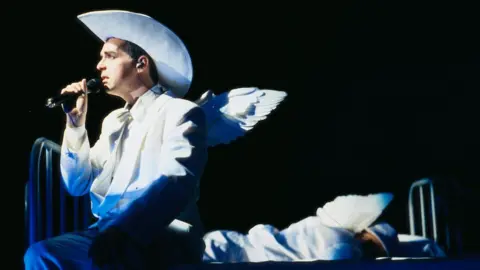 Getty Images
Getty ImagesPop music, Brian Eno once said, isn't just about making music in the traditional sense of the word.
Instead, it's about "the creation of a new, imaginary world, which beckons the listener to join it".
For the last 39 years, the Pet Shop Boys have been doing exactly that, making anthemic dance music that wryly scrutinises culture, politics, personal relationships and the nature of pop itself.
On stage, they've created their own universe where theatre meets pop - pushing the boundaries of what a live show can achieve. And, along the way, they stumbled into one of the best biographies in pop history.
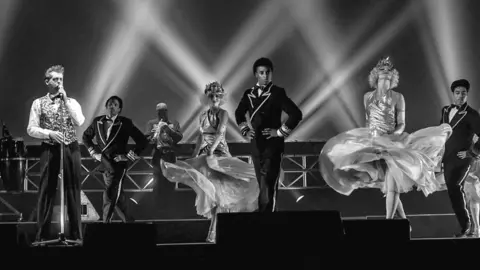 Lawrence Watson
Lawrence WatsonNeil Tennant and Chris Lowe met in a Chelsea electronics shop, where a chance conversation about music and synthesisers started a lifelong friendship and musical partnership.
Four years later, in 1985, they scored their first number one - West End Girls, a walking pace disco track about the drama and excitement of late night Soho, where cultures meet and meld and clash surrounded by "faces on posters" and the ever-present threat of sex or violence - or both.
From the beginning, a sense of mystery surrounded the band. They weren't showy or glamorous like normal pop stars. Tennant wasn't a natural vocalist. On Top of the Pops, they barely moved.
No-one knew quite what to make of them, even as they built up an enviable discography of perfect pop singles. Hovering in the air was the eternal question: Was this all an ironic prank?
The assumption rankled the band, as journalist Chris Heath discovered when he tagged along on their first ever tour.
"Yes, I'm supposed to be the irony merchant," scoffed Tennant, who maintained, "most of what we do is meant totally sincerely".
"When we started out we got into hi-energy and hip-hop music and we liked the power and the rawness and the excitement of it. And we've always tried to make records that had the same delirium and excitement, or a very strong feeling about them.
"But, " he added dolefully, "my voice cannot sound 'up' when I sing. I literally cannot do it."
This interview was captured in Heath's book - Pet Shop Boys, Literally - a phenomenal piece of observational journalism, cataloguing the group's first, tentative venture onto the stage in 1989.
They'd planned and cancelled two previous tours, in 1986 and 1987, discovering that their ambitions for a theatrical live show weren't compatible with the economics of a pop concert.
It was a generous offer from a Japanese promoter that finally got them on the road but, even then, they weren't convinced of the wisdom of playing night after night to actual fans.
"Rock shows are really embarrassing. The audience can be embarrassing and the performers I find cringeworthy," Lowe postulates as they set of for Asia.
Later, at a press conference to promote their shows in Hong Kong, Lowe tells the media: "We're not a live band, really."
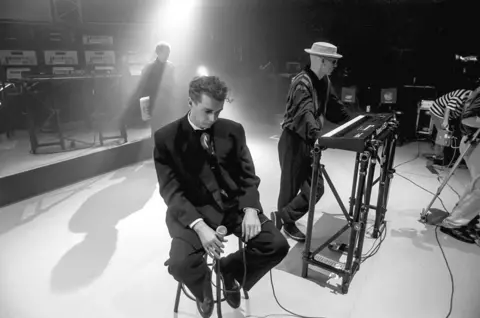 Lawrence Watson
Lawrence WatsonHeath's book offers unprecedented access to the band. He's there in hotel rooms and on tour busses, he dances with them at Japanese discos and takes a long walk with Tennant in the countryside. There are no drugs and no sex (except when they stumble across a couple in flagrante on a hillside).
Instead, it's a frank and revealing peek behind the curtain.
Tennant and Lowe are simultaneously bristling with self-confidence and racked with insecurities, not least because the tour hasn't sold out in the UK.
They are also fantastically catty - slagging off Adam Ant, Piers Morgan, bobble hats, their tour promoter, and even their fans - while getting giddily excited that Jason Donovan might come to one of their shows (he doesn't).
While they're wary of rock cliché, Heath doesn't spare them when things go a bit Spinal Tap.
Before their first concert, Lowe flies into a rage because a backdrop curtain that should be black is, in fact, brown. When his mother comes to see them play in the UK, her first comment isn't about the music but his haircut: "I didn't know you'd become a Buddhist".
Throughout the book, Tennant slowly starts to enjoy himself, finding that being a rock star sometimes is all its cracked up to be.
"I have an obsession with teenage hysteria and just to find myself at the centre of it, I just find quite thrilling," he observes.
But there's mock horror when the singer shouts "arigato", the Japanese word for thank you, at the end of one of the shows.
"I thought 'How shameless,'" Lowe tells Heath. "I bowed my head in shame and thought, 'he's a tart'".
No wonder that, when the band first read the manuscript in 1990, they declared themselves to be "more or less horrified".
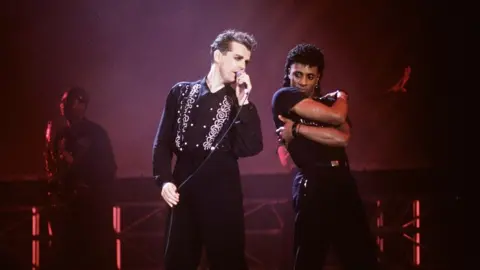 Getty Images
Getty ImagesSadly the book, and its 1993 sequel Pet Shop Boys vs America, have long been out of print... until earlier this week, when they were republished by Penguin books.
"They've been in a weird netherworld," says Heath on the phone from the US. "Perversely, there's something quite nice about having these books that are unavailable and that people talk about like some mystery... But I'd rather people were reading them."
Interestingly, the books were initially written off by reviewers who were sniffy about Heath's decision to delve into the minutiae of touring life, feeling it was all surface and no depth.
The Face's Dave Haslam said Literally "isn't a book, it's a list" adding: "I'd have preferred a book that told a few truths, or even a few lies."
But that misses the point, says Heath.
The author - who, like Tennant, started his writing career at Smash Hits - believed there was value in close-up reporting, without having to explicitly state a grand intellectual thesis.
"I always thought I was going to be able to tell a much deeper story [through] an incredible accumulation of detail," he explains.
"No-one reads a novel and says, 'It's just a load of stuff that happens,' because they go in thinking there's a greater purpose to all this; that all of this stuff is being juxtaposed to do something greater than just telling us a series of events or a series of conversations.
"Any great non-fiction book should be that - but somehow that wasn't the way that people went into a book about pop music."
In the intervening years, though, the book's reputation has grown; and others have adopted Heath's style of reportage - most notably Bill Flanagan, who spent two years on U2's Zoo TV tour for the similarly-revelatory U2 At The End Of The World.
The question remains, though: How did Heath get this unprecedented access?
"There's not an incredibly simple answer," he says. "People took photographers on tour as a standard thing in the 80s and I think they thought, 'Why don't we take a journalist?'
"I was friendly with them, and I'd written about them a bit, but I don't think they had thought about the end result, particularly."
Censorship?
In fact, discussions about the nature of the book form a recurring part of the narrative.
"This can never come out," exclaims Tennant at one juncture, but surprisingly little was expunged from the record.
"Famously, the thing that got cut out of these books is most of when they swear - but that's totally openly declared," insists Heath.
"People imagine there's a whole other unexpurgated version of it - but why would you imagine that in a book that's already way more truthful and revealing than you'd normally expect?"
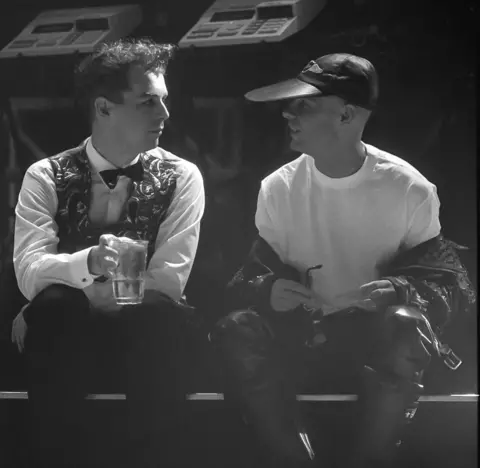 Lawrence Watson
Lawrence WatsonDespite their horror at the original manuscript ("We're horrible, aren't we?" said Lowe after reading it for the first time) the band were sufficiently happy to ask Heath back on the road for their first US tour a couple of years later.
It came at an interesting point for the duo. Their fifth album, Behaviour, had been critically-acclaimed, but failed to scale the chart peaks of their previous work. Their new single, a kitsch cover of U2's Where The Streets Have No Name, wasn't getting the expected radio play, meaning they were embarking on an ambitious tour, in a country that hadn't been their strongest market, from an uncertain base.
It didn't help that the first night had to be cancelled due to sound problems. Then Lowe caused a minor diplomatic incident by walking off stage during a performance on Jay Leno's late night chat show, furious that the camera was focusing solely on Tennant and the backing singers.
The band spend large portions of the tour fretting about their future. Heath captures one typical exchange backstage at Los Angeles' Universal Ampitheater.

"We've gone off the boil with the public," sighs Neil.
"It's all down to the album not being as good," says Chris.
"I think we've lost some of the teenage audience," digresses Neil
"I think we've got to write some simpler, hooky music," says Chris.
"Yeah," says Neil. "That's what I think."

"It was tough," says Heath, "touring America with a record that wasn't on fire, and with this incredibly complicated, expensive show - but I don't remember a huge despondency.
"My more glib memory is that, pretty much always, they've been a mixture of a complete exuberance and [thinking] 'Oh it's all over, let's not bother.'"
Ultimately, the Pet Shop Boys' Performance tour was broadly a success.
The US press welcomed the high-concept, theatrical stage show as a revolution in stagecraft - the San Francisco Examiner called it "more performance art than rock concert" while the New York Daily News compared it to a Met Opera production of Satyricon.
And, of course, Pet Shop Boys did go back and write some "simpler, hooky music". Their next album, 1993's Very, contained the hit singles Can You Forgive Her and Go West, and remains their biggest-seller.
Allow Google YouTube content?
But while Heath's second book has a somewhat traditional "triumph-over-adversity" narrative arc, Heath says that's just a happy accident.
"I've written other books where I've had pressure from the publisher to have some sort of 'moment' at the point where the book ends," he says.
"And I'm not shy of expressing larger themes and showing powerful arcs of things changing; but lives don't end just because the book ends."
Heath went on to write for Rolling Stone and GQ - where Paul McCartney told him he'd envisioned DNA before DNA was discovered while tripping on acid in the 1960s. He also wrote two painfully honest books with Robbie Williams, based on a similarly-unprecedented level of access.
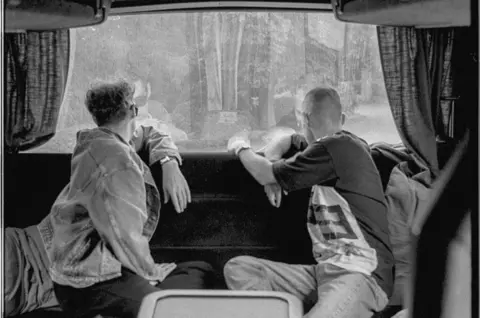 Lawrence Watson
Lawrence WatsonThe key to obtaining such revelatory interviews, he says, is just to be interested in people. And, occasionally, to break with social conventions.
"I always think," he says, "one of the hardest questions to ask, but one of the best questions you can ask is the one I'm about to say...
…
…
…
…
"That was it."
"It's really uncomfortable doing it. You have to deliberately force something that all your instincts are telling you, as a polite human bring, not to do.
"But very often people have more to say, and you've just got to give them space."
Pet Shop Boys, Literally and Pet Shop Boys vs America are out now.

Follow us on Facebook, or on Twitter @BBCNewsEnts. If you have a story suggestion email [email protected].
